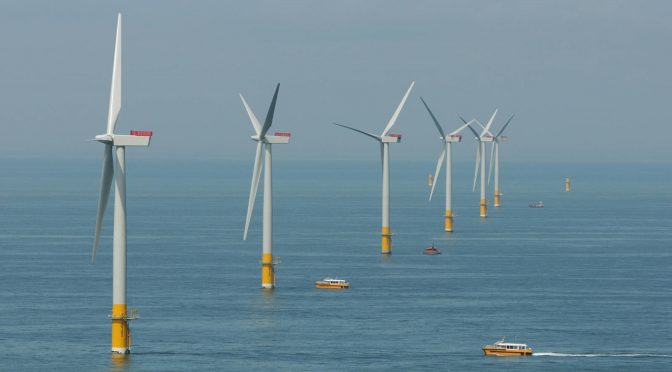The federal decree published in January with laws for offshore wind projects encouraged the sector and Brazil shows potential for world leadership.
Brazil’s nascent offshore wind market is far from complete and the country has more potential to be a world leader in the segment. A publication of Decree 10,946/2022, of January 25, with guidelines for the generation of electrical energy on the high seas, generated a wave of optimism among companies and entities in the sector.
On the business side, a good impression translates into numbers. A list of wind turbine installation projects at the Instituto Brasileiro do Meio Ambiente e dos Recursos Naturais Renováveis ??(Ibama) increased on August 23, 2021, to January 36, totaling, respectively, 46 gigawatts (GW) and 80.4GW. Even considering that energy production on the Brazilian coast should start in 2028, the Ibama data becomes more relevant compared to world production. In the world, the installed capacity was 35.3 GW in 2020, according to the second or last annual report of the Global Wind Energy Council (GWEC).
One of Brazil’s competitive advantages lies in the natural conditions of the extensive coastline. “The Brazilian continental shelf is shallow, between six and 20 meters, while the depth in the North Sea is 60 to 80 meters. In addition, the winds are constant at sea and are not extremely choppy, factors that should reduce costs.” and increase the performance of wind turbines”, says Rodrigo Mello, director of the Center for Gas Technologies and Renewable Energies (CTGAS-ER) and the Senai Institute for Innovation in Renewable Energies (ISI-ER).
The presence of international groups in the country’s deepwater oil production also contributes to a positive assessment of the market. “The investor’s profile is associated with large oil companies that are putting renewable energy in their portfolios, and already have a lot of experience in offshore exploration,” defines Elbia Gannoum, executive president of the Associação Brasileira de Energia Eólica (ABEEolic).
Equinor does not fit the profile described by Gannoum. A Norwegian multinational energy company in Brazil, including oil exploration and technology in deepwater areas. In August, the company submitted to Ibama the offshore wind project in Rio de Janeiro and Espírito Santo with a total potential capacity of 4 GW and “is evaluating outside the areas.”
Shell has not disclosed where it will start but intends to have a strong presence off the Brazilian coast. “Brazil is one of the four priority regions for Shell in renewable energy. We are looking at integrated offshore wind energy without the development of an energy base to make new sources viable,” says Gabriela Oliveira, Project Development Manager at Geração de Energias Renovación de Shell Energy.
One source she cited, Green Hydrogen (H2V), has joined Shell and Equinor on a project off the coast of the Netherlands. The consortium will use offshore wind energy to produce the so-called “fuel of the future”. And the future investors are looking at is the same as for H2V, in the medium and long term. Today, reports the Energy Research Company (EPE), the cost of offshore wind power can range between R$ 250/MWh and R$ 500/MWh and onshore wind power, between R$ 100/MWh and R$ 170/MWh. MWh. The trend, however, is downward, with a cost reduction of 49% by 2050, according to a GWEC report.
In the short term, the first auction, scheduled for 2023, is a milestone in the balance of the business, with the definition of attractive prices for distributors and generators. “I don’t see efficiency in the short term, but, in five years, I can already see an offshore penetration. Large hydroelectric projects should not take off, due to all the controversy over the environmental impact that, in the case of offshore, is much less”, says the energy partner of the Lefosse office, Pedro Dante.
Neglected environmental impact
Ibama has already published the Standard Terms of Reference for the Environmental Impact Study and the Environmental Impact Report (EIA/Rima) of offshore wind farms. Previously, in 2019, a government study showed that wind farms can affect maritime biodiversity and economic activities such as fishing.
These threats worry non-governmental organizations, especially since the new rules come with the signature of the government of Jair Bolsonaro. The Green NGO qualifies the decree as an “uncontroversial fact”: “It is a policy that privileges the interests of sectors of the business community to the detriment of consultative and democratic processes,” contests Vicente Quintão, spokesman for the organization. He also criticizes the government’s environmental policy: “The environmental inspection bodies, which have been gradually emptied during the current administration, will hardly serve as a brake on the most predatory initiatives.”


